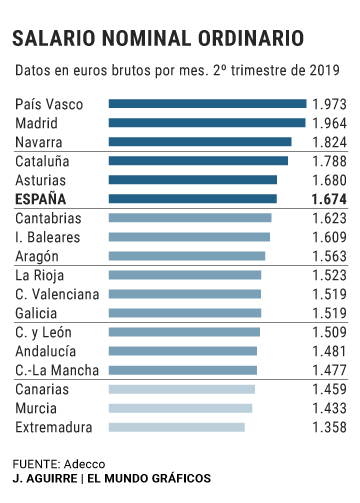Salaries are rising in Spain. They chain their longest period of revaluation since 2010, with eight quarters of consecutive increases (1.7% year-on-year in the second half of this year) and with a positive trend in all the autonomous communities. But this improvement is still not enough to mitigate the loss of purchasing power of the Spaniards, with a decline of ten consecutive quarters, yielding 0.7% since March 2017.
Specifically, ten communities reflect losses of purchasing power in their average salaries in the last two years. The biggest drop is that of Castilla La Mancha, whose inhabitants, according to the latest Adecco Monitor of Opportunities and Job Satisfaction, have lost about 663 euros of purchasing power in just two years. They are followed by Murcia (-573), Andalucía (-419) and La Rioja (-403).
But also the citizens of Madrid today have less purchasing power than two years ago, with a decrease of 352 euros, much more pronounced than the national average, which reflects a loss of 133 euros since 2017.
In contrast, the inhabitants of the Balearic Islands , Galicia and Navarra , with increases of 427, 251 and 199 euros, respectively, today have more consumption capacity than two years ago, by crossing the evolution of wages and inflation.
The loss of generalized purchasing power in Spain occurs despite the improvement - still shy, but constant - that is occurring in the salary sector. The average salary in the whole of Spain is today at 1,674 euros per month (gross salary, without extra payments) and has grown 1.7% in the second half of the year compared to the same period of 2018. Where more is collected, in the Basque Country, with an average salary of 1,973 euros, which has grown by 1.5% in the last year. Just after, at a very short distance, the Community of Madrid , which has seen its average salaries grow by 1.1% from 2018 to 1,964 euros.
The largest year-on-year increase was, according to Adecco's report, the one experienced in Catalonia , where salaries have climbed 2.4%, to 1,788 euros.
And a smaller increase has occurred in Murcia , whose average salary has only grown by 0.1%, to 1,433 euros, and which occupies the second position the tail of this particular ranking. Queen, but as a red lantern, Extremadura , with the lowest average salary in the country: 1,358 euros.
The salary increases that reflect this study by Adecco already partially reflect the stretch of the Minimum Interprofessional Salary (SMI), which this 2019 has experienced an increase of 22.3%, up to 900 euros per month.
The most repeated salary
The most frequent average salary in Spain was, according to the latest Annual Salary Structure Survey of the National Statistics Institute, of 17,482 euros. They are 2017 data - the latest available - and reflected that the most usual salary in our country, the one that receives a greater number of people, is 26.1% below the average salary of the Spaniards as a whole, which reached 23,646 , 5 euros in the aforementioned 2017.
Income in Spain varies greatly, in addition, depending on the type of employment contract you have. In general, according to the INE, workers with a contract of temporary duration charge 32.1% less than those who have an indefinite contract.
And there is also a pronounced gender gap in wages : in 2017, women earned an average of 21.9% less than men. The trend, of course, is being corrected, although still very slowly. A year before this INE survey, in 2016, the difference was 22.3%.
Also yesterday, UGT published a report on the Spanish labor market, making an impact on the record of overtime recorded in 2018: 330 million. Without them, the union defended, 180,000 additional jobs could have been created.
According to the criteria of The Trust Project
Know more- Spain
- Murcia
- Madrid
- UGT
- Basque Country
- Navarre
- Andalusia
- Madrid's community
- Balearics
- Galicia
- Estremadura
- Catalonia
- minimum salary
- Pensions
- Unemployment
According to Adecco, the average salary in Spain cuts its purchasing power by 133 euros annually since 2017
Macroeconomics La Mancha, the region that takes the least time to recognize aid for the unemployed, and Madrid, the one that most
Housing Rent vs. purchase. This is how prices have behaved (with great differences) by communities since the crisis

